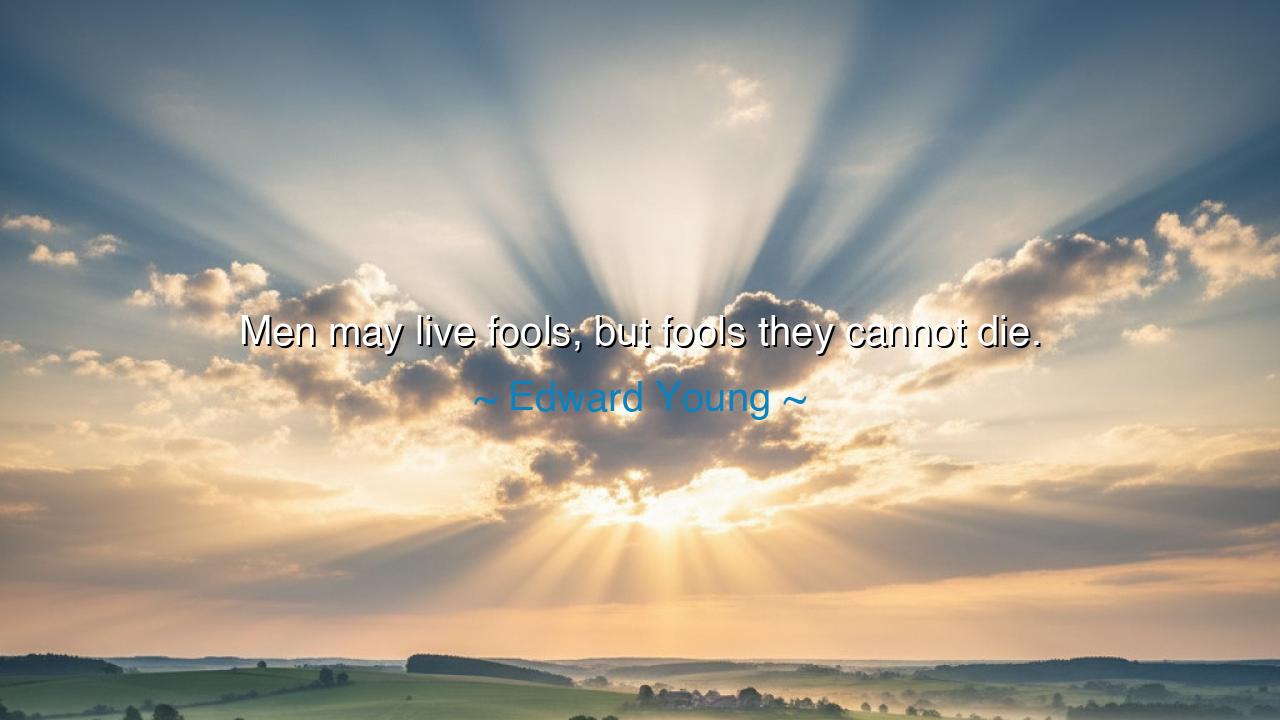
Men may live fools, but fools they cannot die.






The words of Edward Young strike like a riddle and yet contain a depth of wisdom: “Men may live fools, but fools they cannot die.” At first glance, it seems strange, for if a man lives as a fool, would he not die in folly as well? But Young reveals a greater truth—though a man may squander his life in ignorance, idleness, or vanity, the hour of death strips away all illusions. Death is the one teacher none can refuse, the mirror in which every falsehood vanishes. A fool may pass his years blind, but in the final hour, the veil is torn, and he must see.
The origin of this thought rests in Young’s meditations on mortality, for he was a poet of the night, a writer who wrestled with death and eternity. In his Night Thoughts, from which this line springs, he sought to awaken men from complacency, to remind them that life is brief, and that only wisdom—born of virtue and humility—endures beyond the grave. To live foolishly is common, for men chase wealth, vanity, or pleasure without thought of their souls. But to die foolishly is impossible, for in that final hour all masks fall away, and the soul stands naked before eternity.
Consider the example of King Louis XVI of France. He lived in opulence, shielded from the cries of his people, and many would say he lived as a fool, blind to the tides of history. But when death came, and he stood before the guillotine, his voice grew calm, his words solemn, and his bearing dignified. In that moment, he was no longer the fool of Versailles but a man made sober by the reality of death. Thus, Young’s words prove true: men may live as fools, but death awakens even them to truth, though it may come too late to alter their course.
The ancients also saw this. Socrates taught that philosophy is the practice of learning how to die. He watched men chase shadows all their lives, believing themselves wise, only to be unmasked by death. Socrates himself met death with serenity, proving that to live wisely is to be prepared for that final hour. Those who ignore it, living in folly, cannot escape its lessons—at the end, the truth they denied all their lives will stand before them, undeniable and absolute.
This saying of Young is both a warning and a call to action. It warns that though folly may accompany a man in life, he cannot carry it into death, for death forces wisdom upon all. Yet it calls us also to seek wisdom now, before the final hour, lest we reach the end with nothing but regret. To live as a fool is common, but to strive for wisdom each day is the path of the rare and noble soul.
The lesson, then, is clear: do not wait until the grave to awaken. Reflect on your life now, in the daylight of your days, and ask: am I chasing shadows, or am I seeking what endures? Am I living for vanity, or for virtue? The fool delays until the last hour, when the truth comes unbidden; the wise prepare their souls early, so that when death arrives, they greet it as a friend rather than as a terror.
Practical action lies before us: meditate daily on mortality, not with fear but with gratitude. Keep before your eyes the brevity of life, so that each action may be filled with purpose. Cultivate humility, wisdom, and compassion, for these are treasures that outlast the grave. And when you see others living in folly, do not scorn them, but gently remind them that the final hour will teach what they have refused to learn.
So let us remember Edward Young’s truth: men may live fools, but fools they cannot die. Let us not wait for the last hour to strip away illusion—let us strip it away ourselves, here and now. In doing so, we may live not as fools but as the wise, and when death comes, it will not come as a robber, but as a guide leading us to eternity.






AAdministratorAdministrator
Welcome, honored guests. Please leave a comment, we will respond soon